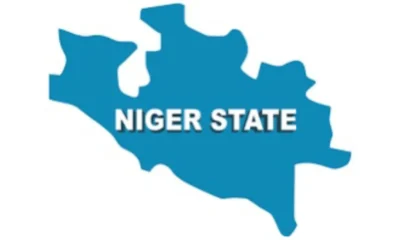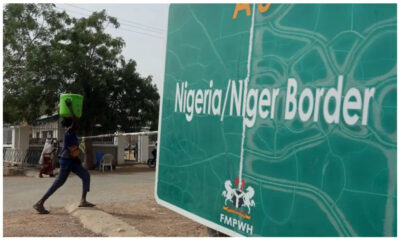metro
Cameroon, Niger, Benin citizens lament fuel subsidy removal in Nigeria
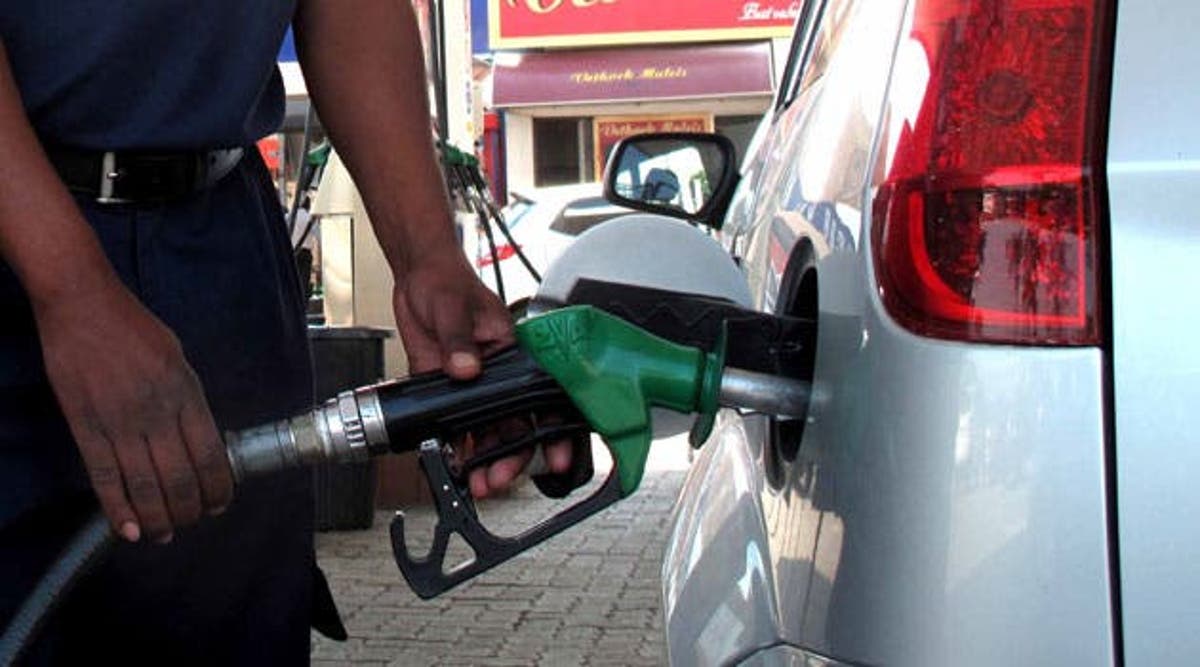
Cameroon, Niger, Benin citizens lament fuel subsidy removal in Nigeria
Prices of petroleum products have nearly doubled in Cameroon, Benin Republic and Niger following the removal of fuel subsidy in Nigeria, findings by Daily Trust Saturday revealed.
Cheap petrol from Nigeria was regularly smuggled to as far as Sudan, a North African country, making it difficult for Nigerian authorities to save enough to provide services to the people.
The subsidy removal in Nigeria has also affected social and economic life in the neighbouring countries, with sources saying black market activities have significantly reduced.
The removal of fuel subsidy was announced on Monday, May 29, by President Bola Tinubu during his inaugural speech.
inubu on Friday, June 9, justified the action, stating Nigeria cannot continue acting as ‘Father Christmas’ to neighbouring countries.
He said this at an interactive session with the Royal Fathers under the aegis of the National Council of Traditional Rulers of Nigeria (NCTRN) at the Aso Villa.
No longer at ease at neighbours’ doorsteps
Our reporters learnt that petroleum products are being sold at CFA700 or CFA 800 in Benin Republic, nearly double the previous price, CFA 450.
The development lends credence to reports that a significant volume of Nigeria’s subsidised petroleum products were being smuggled into other African countries.
READ ALSO:
- Ex-Rep member, 3 Sterling bank officials convicted of N212m fraud
- OAU’s 100-level student commits suicide
- Subsidy removal: NEC raises committee to consider N702bn minimum wage
The chief executive officer of the Nigerian National Petroleum Company (NNPC) Limited, Mele Kyari, in a media interview said, “We know how much we supply. There is data on this. Is all of this consumed in the country? The answer is no. The reason is very simple. We have an arbitrage environment. For instance, before this decision we made, fuel sold at N185 in Abuja, but just across your border, there is nowhere you would have prices that are lower than N500 per litre.
“None of the countries around us imports petroleum products, and you can’t do something about it because there is an arbitrage environment we have created. We have 4,500km of land borders and you don’t have all the resources to man them,” he said.
Questionable businesses grounded
Transporters, passengers and traders in neighbouring countries said they were grounded by the increase in the price of petroleum in Nigeria.
Speaking to Daily Trust Saturday, a top player in the Nigerien petroleum sector, Bio Abdourahamane, admitted that subsidy removal in Nigeria would have more negative effect on his country.
He said that before the subsidy removal, smuggled Nigerian fuel used to flood his country’s oil market and most consumers preferred buying it due to its cheapness, thereby preventing them from selling their domestic fuel favourably.
“Nigeria was selling at N195 and our domestic fuel sold at CFA508 (N381), so the smuggler took that advantage to exploit Niger’s market, selling below our litre price.
“At that time, we faced a lot of challenges selling our product because smuggled oil is cheaper, but now that the subsidy is removed, we can compete or even sell at a lesser price.
“But our fear is that if our fuel sells cheaper now, we would face the risk of shortage; and our product being smuggled into Nigeria, to Borno, Yobe, Kano, Katsina and Sokoto, among others and our fuel capacity is so little to accommodate that,” he said.
Malam Ali, the chairman of Niger/Nigerian transporters, lamented that the subsidy removal had plunged vehicle owners and passengers into economic crisis.
“Petrol is now too expensive that our drivers and passengers cannot cope. A passenger will now pay N10, 000 as transport for what he used to pay N6, 500,” he lamented.
He called on the Nigerien government to look inward and see how the situation could be regulated and bring succour to the citizens.
Malam Musa Abdullahi, the leader of Nigerian taxi owners in Diffa, also lamented that the subsidy removal in Nigeria jerked up fuel price in Niger, forcing many people to park their vehicles.
READ ALSO:
- Naira will appreciate soon, says JP Morgan, predicts N600/$
- Police commission elevates Mba, Ciroma to DIG, appoints 14 new AIGs
- FACT-CHECK: Did DSS find a lot of money in Emefiele’s house?
“For one week, my car has been parked at home due to the increase in the fuel price because you would go out and burn the little you have without seeing passengers to pick.
“Fuel is available but it is more expensive in border towns where there are no filling stations. For instance, I only know of filling stations in Maine Soroa, Diffa town and Gigime, but I don’t know any in Boso, Kablewa, Jakori, Garin Wanzam, Kinchambi and Tumar. All these are big towns that are supposed to have filling stations. Unfortunately, they don’t have any.
“The consequence of that is that you can only buy fuel at the black market. We are now buying a five-litre gallon at N5, 000, against the old price of 3,000 and a 28-litre jerry can at N25, 000, against the N15, 000 it sold previously,” he said.
Situation same in Cameroon
Cameroonians living along the border with Nigeria have lamented the effect of subsidy removal by Nigeria, calling on President Tinubu to reconsider the decision.
Fuel smuggled from Nigeria provides Cameroonian border communities with cheaper alternative. In fact, many communities are without filling stations to dispense petroleum products; therefore, residents rely mainly on black marketers.
Residents told Daily Trust Saturday that life had not been easy since the announcement of subsidy removal by the Nigerian authorities. Commercial motorcycle operators across the border expressed fear that they would be pushed out of business.
READ ALSO:
- Oyo Poly female student brutally murdered
- Tinubu advisory council wants Customs, NIMASA, FIRS merged, illegal refineries formalised
- West Darfur governor abducted, killed as war in Sudan spreads
It was learnt that they even staged a protest to press home their demands, but considering that the channel they used to get the fuel was not legal, there was no any response.
Muhammadou Auwal, a business man in Garwa, said the increase in petrol prices took the people by surprise, saying the price of a litre of petrol suddenly jumped from round N300 to N800 equivalent.
“We never expected it because the prices of Nigerian fuel, although unstable, had always been relatively low and affordable. This increase is pushing transporters out of business because here, you cannot increase transport fares as you wish.
“We have our own local supply of fuel, only that border communities take advantage of cheap oil from Nigeria, which does not go beyond 150 kilometres. So it is limited to areas around the border, but it has a huge impact,” he said.
The pump price of petrol stands at CFA730, which is N900, to N1, 000 equivalent, while the smuggled petrol, which previously sold at N300, has risen to N850 equivalent following subsidy removal.
Yahaya Bello, a resident of Beka, depends on his motorcycle for movement within the general area and across the border into Nigeria and petrol had never been a problem until recently when it became scarce and expensive.
metro
Edo Gov Okpebholo Joins Benin City Youths in Protest Over Power Outages
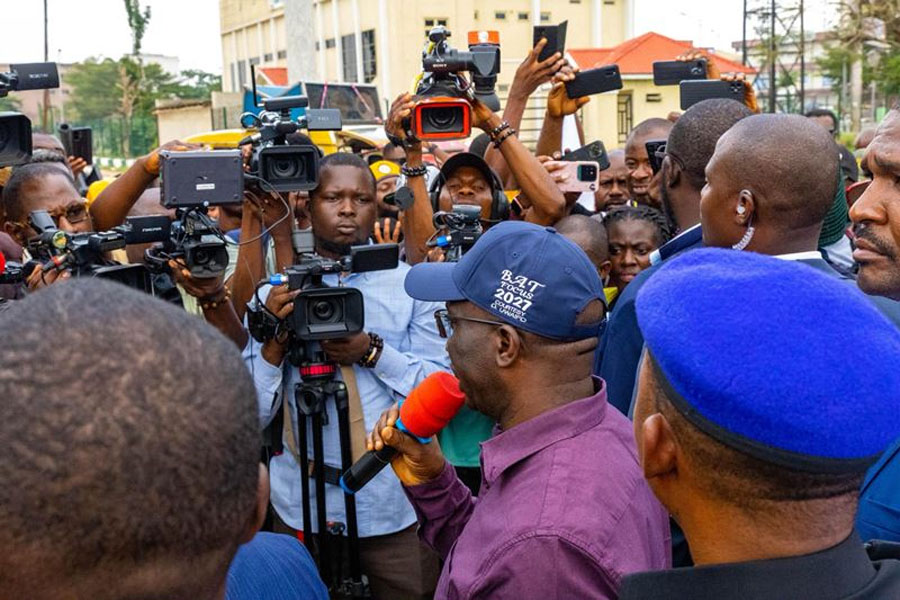
Edo Gov Okpebholo Joins Benin City Youths in Protest Over Power Outages
Benin City, Edo State — Edo State Governor Monday Okpebholo on Monday publicly aligned himself with youths and residents protesting persistent power outages and billing challenges linked to the Benin Electricity Distribution Company (BEDC). The protest took place at Ring Road in Benin City, with demonstrators carrying placards reading “We say no to BEDC oppression,” “No light, no bill,” and “Edo people say no to bulk billing.”
The protesters decried prolonged blackouts, estimated electricity bills, and what they described as the exorbitant cost of prepaid meters, which they say range between ₦150,000 and ₦400,000. Residents also questioned the transparency of BEDC’s free meter distribution initiative, urging the company to publicly disclose beneficiaries.
Governor Okpebholo, reportedly passing by the protest area, stopped to address the crowd. He expressed solidarity with the demonstrators, saying he stood with them “as fellow youths seeking fairness.” The governor acknowledged that electricity challenges affect both rural and urban communities in Edo State and appealed for calm while the government engages relevant stakeholders to find solutions.
READ ALSO:
- The world dislikes the weak, by Hakeem Baba-Ahmed
- Pastor, Wife Arrested in Bayelsa Over Alleged Rape of 13-Year-Old Girl
- DSS Busts Alleged Arms Trafficking Network in Gombe, Seizes RPGs
While clarifying that BEDC is privately owned and not directly controlled by the state government, Governor Okpebholo pledged that efforts would be made to tackle the residents’ concerns. He suggested liberalising the electricity distribution sector to attract new investors and reduce what he described as a monopoly. Drawing a comparison with the telecommunications industry, he noted that introducing more players would improve service delivery and provide consumers with options.
The governor also announced plans to convene a stakeholders’ meeting on Tuesday and urged the protesters to nominate five representatives to participate in discussions aimed at addressing electricity supply and billing issues.
Speaking on behalf of the protest group, Comrade Ogbidi Emmanuel said residents were compelled to act due to what they termed oppressive practices by BEDC. He emphasized the financial burden caused by prepaid meters and irregular billing, stating: “We pay for light and they give us darkness.”
Eyewitnesses reported that the protest remained peaceful, with security personnel ensuring order. The demonstrators dispersed following Governor Okpebholo’s address. As of press time, BEDC had not issued an official response to the claims raised by residents.
Edo Gov Okpebholo Joins Benin City Youths in Protest Over Power Outages
metro
Pastor, Wife Arrested in Bayelsa Over Alleged Rape of 13-Year-Old Girl

Pastor, Wife Arrested in Bayelsa Over Alleged Rape of 13-Year-Old Girl
YENAGOA, BAYELSA STATE — The Bayelsa State Police Command has arrested a pastor and his wife over the alleged rape of a 13-year-old girl in Yenagoa, the state capital.
The suspects were apprehended by operatives from the Ekeki Division during a Sunday church service. Eyewitnesses said the pastor initially fled through a back exit after sighting police officers but later surrendered himself when his wife was taken into custody at the church premises.
According to reports, the victim is a relative of the pastor’s wife. The teenager allegedly told investigators and members of the National Association of Women Against Gender Based Violence and the Do Foundation that the abuse occurred about five times beginning in November 2025.
The girl reportedly said the incidents happened whenever her mother sent her to deliver a local bread known as “madiga” to the pastor’s wife. On one occasion, when the wife was not at home, the pastor allegedly invited her inside the church, locked the door and assaulted her. She further alleged that similar incidents occurred on other visits to the pastor’s residence.
READ ALSO:
- HURIWA Warns of Alleged Foreign Media Plot to Undermine Tinubu Ahead of 2027 Elections
- Human Rights Lawyer Warns Against Targeting Children, Hospitals in U.S – Israel Military Action
- Several U.S. Warplanes Crash in Kuwait Amid Ongoing Iranian Strikes
The minor said she initially kept silent out of fear but later informed her mother after noticing she had missed her menstrual cycle. Following the revelation, the mother confronted the pastor and his wife.
Sources disclosed that the pastor’s wife allegedly handed the mother N120,000 to facilitate an abortion after a medical scan reportedly confirmed pregnancy. The mother was said to have been persuaded by a relative not to “destroy God’s house” at the time.
The matter, however, escalated during a church service where the pastor and his wife were reportedly heard thanking God for helping them overcome enemies allegedly trying to bring down the church. Feeling distressed by the public display, the victim’s mother later filed a formal complaint at the Ekeki Police Division.
She also petitioned the complaint unit of the National Association of Women Against Gender Based Violence, led by Dise Harry.
Confirming the development, the Bayelsa State Commissioner of Police, Iyamah Daniel Edebor, said the case has been transferred to the Gender Unit of the command for thorough investigation and possible prosecution.
Police authorities assured that due process would be followed in handling the alleged rape case in Bayelsa, emphasizing that offences involving minors are treated with seriousness under Nigerian law.
The incident has sparked reactions in Yenagoa, with some church members reportedly seen at the police station discussing the development as investigations continue.
Pastor, Wife Arrested in Bayelsa Over Alleged Rape of 13-Year-Old Girl
metro
DSS Busts Alleged Arms Trafficking Network in Gombe, Seizes RPGs
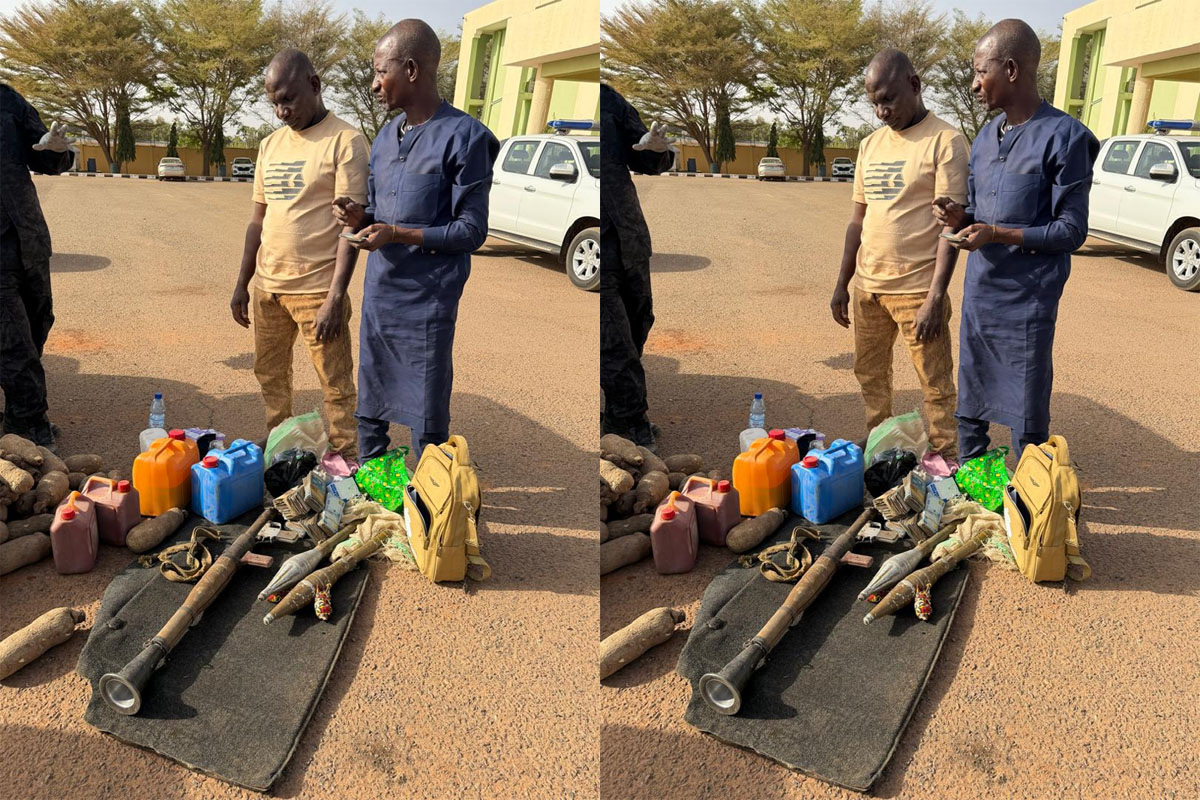
DSS Busts Alleged Arms Trafficking Network in Gombe, Seizes RPGs
Operatives of the Department of State Services (DSS) have arrested two suspected arms couriers and recovered rocket-propelled grenade (RPG) equipment during a security operation in Gombe State.
The suspects — Muhammed Alhaji Mohammed, 55, and Sani Gesha, 47 — were intercepted at Mararaban Tula in Kaltungo Local Government Area while travelling in a grey Toyota Corolla with registration number Taraba JAL475YQ. Security sources said the vehicle was stopped following weeks of intelligence-driven surveillance targeting an alleged bandit network operating across parts of the North-East.
During the operation, DSS operatives reportedly recovered two Rocket Propelled Grenade (RPG) warheads, an RPG launcher and other items believed to be linked to banditry and arms trafficking activities. Sources familiar with the investigation said the weapons were suspected to be part of a consignment intended for delivery to criminal elements operating in neighbouring states.
According to security officials, the arrests followed over three weeks of covert monitoring of a trafficking syndicate allegedly connected to a notorious bandit leader operating across Bauchi, Gombe, Taraba and Adamawa states. A source disclosed that the operatives monitored the group closely before launching a coordinated operation that led to the suspects’ arrest with what was described as a significant cache of arms and ammunition.
READ ALSO:
- HURIWA Warns of Alleged Foreign Media Plot to Undermine Tinubu Ahead of 2027 Elections
- Human Rights Lawyer Warns Against Targeting Children, Hospitals in U.S – Israel Military Action
- Several U.S. Warplanes Crash in Kuwait Amid Ongoing Iranian Strikes
Preliminary investigations reportedly revealed that the recovered weapons were meant to be delivered to one Ardo Hamma Ari, said to be a resident of Kukawa Village in Alkaleri Local Government Area of Bauchi State. Authorities are expanding investigations to track other members of the network and uncover the source and intended use of the weapons.
In a related development, DSS operatives also rescued a six-year-old boy, Mohammed Jabir, at Gyada Village in Talase, Balanga Local Government Area of Gombe State. Security sources said the child had allegedly been kidnapped by one Salisu Hussain under the pretext of teaching him how to ride a motorcycle.
Following a report by the family, DSS operatives launched a swift operation that led to the safe rescue of the boy and the arrest of the suspected kidnapper. The child has since been reunited with his parents, who expressed gratitude to the DSS for the prompt intervention and safe return of their son.
Security authorities confirmed that all suspects are currently in DSS custody and will be arraigned in court upon conclusion of investigations. Officials emphasized that the operation underscores ongoing efforts to combat illegal arms trafficking, banditry, and kidnapping in the North-East region, reaffirming the agency’s commitment to dismantling criminal networks and enhancing public safety.
DSS Busts Alleged Arms Trafficking Network in Gombe, Seizes RPGs
-

 International3 days ago
International3 days agoAyatollah Ali Khamenei, Iran’s Supreme Leader, Dies After U.S.–Israeli Strikes
-

 International3 days ago
International3 days agoIran: US, Israel launch another strikes, Commander, Defence leader, five other top officials killed
-

 International3 days ago
International3 days agoKamala Harris Slams Trump for Dragging U.S. Into ‘Unwanted War’ in Iran Conflict
-

 metro2 days ago
metro2 days agoHajj, Umrah Are for Muslims Only – Scholar Urges NAHCON to Tighten Screening
-
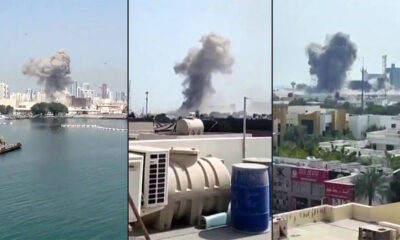
 International2 days ago
International2 days agoIran Retaliates: Gulf States Allied With US Hit by Missiles, Drones
-
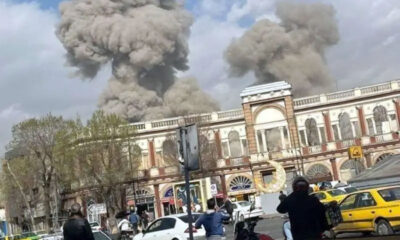
 International2 days ago
International2 days agoSaudi Arabia Denies Lobbying US to Strike Iran as Gulf States Respond to Escalation
-

 International3 days ago
International3 days agoBREAKING: Iran Forms Three-Member Leadership Council to Steer Country After Khamenei’s Death
-

 International1 day ago
International1 day agoSeveral U.S. Warplanes Crash in Kuwait Amid Ongoing Iranian Strikes





